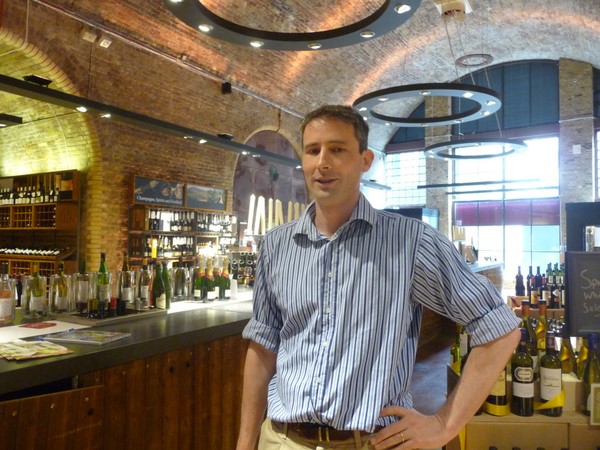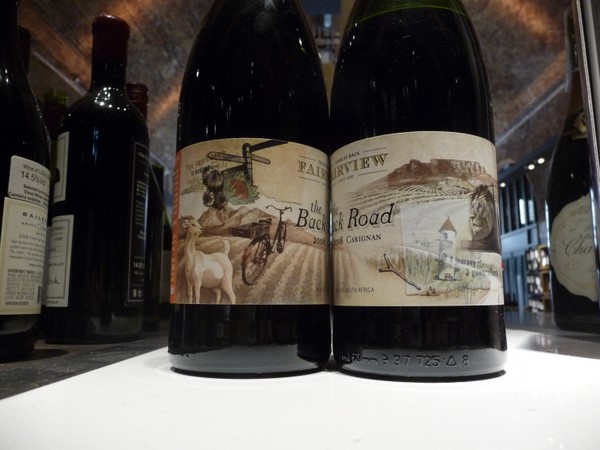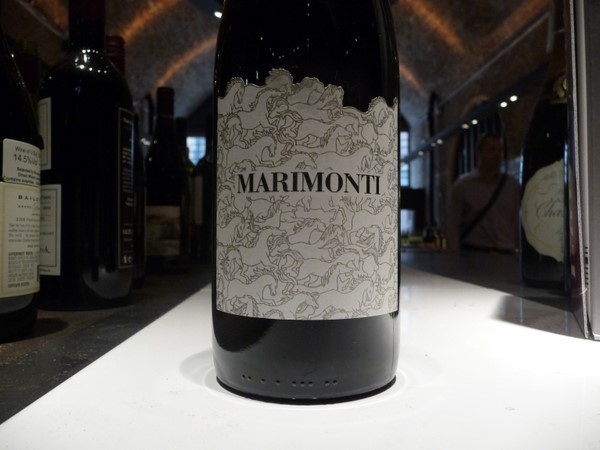|
Laithwaites
A welcome change of direction for this important UK retailer?
Website:
www.laithwaites.co.uk

Justin Howard-Sneyd at the Laithwaites store
in Vinopolis
One
of the UK’s most successful wine retailers is Laithwaites. Formed
in 1969 by Tony Laithwaite and his wife Barbara (who still own the
company), their big break came in 1973 when they launched the Sunday
Times Wine Club. The business grew and grew, and Laithwaite
developed a shrewd understanding of direct mail, the means by which
the company grew, assisted also by the patronage of Hugh Johnson.
As a
wine love, I must admit to having been a Laithwaites sceptic. While
I admire their mastery of marketing and direct mail, I have largely
been unconvinced by their wines.
The
marketing angle? We go direct to the producer to unearth small
parcels of special wine and by cutting out the middleman we save you
money. The reality? We send in a consultant winemaker, buy clean but
cheap wines, dress them up to look like more expensive wines (almost
all the wines are exclusive private labels), and then list them at a
higher price than the wine would otherwise justify. Then we reel
customers in with what look like amazing discounts, advertised in
newspaper supplements and through a range of co-branded clubs. And
once we’ve got the customer to sign up to a quarterly case of
wine, we've got them hooked on what are largely mediocre wines that
don’t deliver great value for money – that’s where the profit
is.
But
I’m an open-minded fellow, and so I happily agreed to meet with
Justin Howard-Sneyd, 9 months into his new job as Global Wine
Director, and Becca Reeves, six months into her new job as buyer,
along with head of PR, Kate Diggle, to hear about changes taking
place at Laithwaites. We gathered at the new flagship store in
Vinopolis, near London Bridge.

‘Laithwaites
has changed a lot in the last three years,’ says Justin. In truth,
it needed to, because Direct Wines (the company that owns
Laithwaites, as well as Averys and Virgin Wines) had been going
through a sticky patch. Some investment decisions hadn’t paid off:
a big new warehouse resulted in logistics troubles which meant that
customers were lost. And the wines weren’t as good as they should
have been: the company was stretching the business model just a
little too far. (In 2008 Laithwaites posted a loss of £5.5
million.)
But
things have been changing under new CEO Simon McMurtrie. Initially,
McMurtrie was brought in as a consultant to help Laithwaites spread
to other countries, but Tony Laithwaite was so impressed he hired
him as CEO. Justin describes McMurtrie as ‘an incredibly
inspirational leader. Simon is not afraid to do what he wants at
pace – it’s very refreshing.’
McMurtrie
shook up things a bit, and made some personnel changes. He hired
Justin, as well as Becca, and the quality of the buying has
improved. ‘It’s turning us into a credible wine merchant as well
as a mail order company,’ says Justin. ‘There are still a few
wines in our range that I’m not super-proud of, but they will be
going.’ He adds, ‘I’m ever more excited by the potential,
knowing we are going in the right direction.’
I was
surprised when I heard Justin had left Waitrose to move to
Laithwaites. But the advantage of a direct-to-customer business like
this is that there is a proper channel of communication with the
consumer. It’s possible to tell them stories about the wines they
buy, and suggest that they try new things in a way that simply
isn’t possible in a supermarket where the only interface with the
customer is the wine bottle sitting on the shelf. ‘The single most
important reason I made the shift was the ability to connect with
customers,’ Justin reveals. ‘The most important thing is the
trust of our customers: we have a great relationship.’
Laithwaites
is big. There are close to 1 million customers who have bought wine
in the last year, and of these half are regulars. This core of
regulars is strong and steady, but there is a portion of the
customer base who buy just one or two cases and then stop, and they
are replaced by 200 000 new customers who are recruited each year.
Virgin
Wines and Averys, also part of the Direct Wines empire, are run
autonomously: the buying, marketing and logistics are all separate.
Virgin Wines is being rolled out to Australia and the USA soon.
Laithwaites
is currently growing abroad. 70% of business is in the UK, but now
some 25% is in the USA. They acquired Lionstone in Illinois in June
2006, which has helped them get a strong foothold in the notoriously
tricky US market, with its three tier distribution system. A tie-in
with The Wall Street Journal has been successful, and now
Laithwaites operate in 37 US states with a turnover of $100 million.
The remaining 5% of business is in Australia, Hong Kong, Germany and
Switzerland.
In
the UK, half to two-thirds of business is continuity: people who
take a case a quarter, with a cost of £75–79 a time. Laithwaites
have introduced a £99 ‘Discover Better’ case, which has proven
extremely popular and went 35% over forecast.
While
primarily a mail-order business, the website now accounts for 35% of
sales (although most people will have seen the wines advertised in a
print publication), and there are 11 shops, mainly spread across the
southeast in quiet suburban locations. They act as a showcase of the
Laithwaites range.
‘My
mission in retailing is to lift wine from being just a product,’
says Justin. ‘When someone reads a really good book, they have a
relationship with it. Laithwaites are in a position to do this with
wine.’
I
tasted a small selection of wines from their range, and despite my
initial scepticism, came away impressed. It seems that things are
changing at Laithwaites. There’s quite a way to go, but a start
has been made.

Some
highlights:
Passa
Pequena 2008 Douro, Portugal
Made by Jorge Borges at Quinta do Passadouro. Fresh, supple and
bright with cherry fruit backed up by a savoury, mineral edge and
some subtle herbiness. Simple and fruity but with Douro typicity and
a hint of seriousness: I really like this wine, and it’s great
value for money. 89/100 (£8.49 Laithwaites)
Gran
Casali Lambrusco Grasparossa 2009 Italy
This is a top quality sparkling red Lambrusco, weighing in at
11.5% alcohol, and with sweet cherry and plum fruit backed up by
good acidity, as well as some fizziness. Brilliant fun and actually
quite food friendly, finishing dry. 89/100 (£9.99 Laithwaites)
Solar
das Bouças Loureiro 2009 Vinho Verde, Portugal
Fruity and appealing with some mineral freshness on the nose.
Bright, crisp mineral palate with good fruit precision and some pear
notes. A nice fresh wine. 86/100 (£6.99 Laithwaites)
Hans
Lang Riesling QbA 2009 Rheingau, Germany
Attractive fruity, lemony nose. The palate is crisp, fresh and
bright with citrus fruit and a nice long finish. A hint of sweetness
rounds things off nicely. Very appealing. 88/100 (£8.99 Laithwaites)
Valoroso
Cabernet/Castelão 2008 Terras do Sado, Portugal
Made by Jaime Quenderas at Ermelinda Freitas. Fresh, plummy,
cherryish and bright with lovely sweet, pure, focused fruit. This is
a deliciously pure, fruity wine of real appeal. 89/100 (£7.99
Laithwaites)
Marimonti
Barbera Montepulciano 2008 VdT, Italy
An unusual blend but it works brilliantly. Dense, dark plummy
fruit with a delicious spicy intensity to it. Ripe but savoury and
mouthfilling, this is a bit of a bargain. A blend of fruit from
Abruzzo and Piemonte. 91/100 (£7.99 Laithwaites, currently on offer
at this price)
Fairview
The Back Road Carignan 2008 Swartland, South Africa
Bright, sweet, fresh dark cherry, plum and blackberry fruit
nose. The palate is sweet and fruity with lovely density and nice
spiciness. Oak is present, but it’s not overdone. Delicious stuff
from Charles Back. 90/100
Lenswood
Hills Pinot Noir 2009 Adelaide Hills, Australia
Produced by Pikes. Very open sweet cherry and berry fruit nose
with a subtle leafy edge. The palate is generous, ripe and plummy
with a lovely sappy edge. This is quite elegant, and at this price
is fantastic value. Grown-up Pinot Noir at a great price. 90/100 (£9.99
Laithwaites)
Lustau
Dry Oloroso NV Jerez, Spain
Orange/brown in colour, this is a serious Sherry. Lovely savoury,
nutty nose with some sweet raisiny notes. The palate is dry with
lovely concentration and nutty complexity, finishing fresh and
tangy. 92/100 (£8.99 half bottle, Laithwaites)
Andresen
Colheita Port 1982
Orange/brown colour. Nutty, waxy and tangy with lovely viscous
texture and notes of raisins and casks. Beautifully integrated and
showing great concentration. Lovely. 93/100 (£20 Laithwaites)
Wines
tasted as 06/10
Find these wines with wine-searcher.com
Back
to top
|

